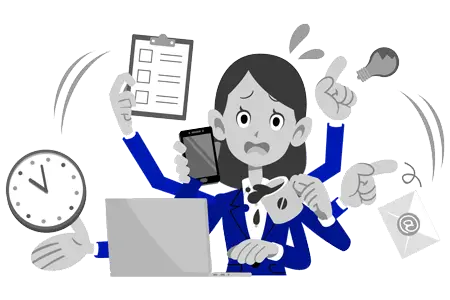Several factors can contribute to wasting time in team meetings. Identifying and addressing these issues can lead to more productive and efficient meetings. Some of the most common time-wasting elements in team meetings include:
- Lack of Clear Objectives: Meetings without clear objectives and agendas can easily become unfocused and meandering. Participants may lose sight of the meeting’s purpose, leading to prolonged discussions that don’t accomplish anything.
- Poorly Defined Roles: When roles and responsibilities within the meeting are unclear, people might talk over each other or duplicate efforts, resulting in inefficiencies.
- Overly Long Meetings: Meetings that stretch beyond their scheduled time can be draining and lead to reduced engagement. People may become disinterested or mentally check out, decreasing the meeting’s effectiveness.
- Lack of Preparation: Participants who come unprepared can slow down discussions as they catch up on information or ask questions that could have been addressed beforehand.
- Tangential Discussions: Off-topic or tangential discussions can be entertaining but distract from the main purpose of the meeting.
- Dominating Participants: When one or a few individuals monopolize the conversation, it can prevent others from sharing their ideas and input, leading to an unbalanced and unproductive discussion.
- Ineffective Facilitation: Meetings require skilled facilitation to keep the conversation on track, maintain focus, and involve all participants. A lack of effective facilitation can lead to chaos and wasted time.
- Multitasking: Participants engaging in unrelated tasks during the meeting, such as checking emails or working on other projects, can hinder their ability to contribute and fully engage in the discussion.
- Overcrowded Invitations: Including too many people in a meeting who don’t directly contribute or benefit from the discussion can slow down decision-making and add unnecessary complexity.
- Rehashing Decisions: Spending too much time revisiting and re-discussing decisions that have already been made can consume valuable meeting time.
- Lack of Follow-Up: Meetings that don’t result in actionable outcomes or follow-up actions can make the time spent feel unproductive.
To overcome these time-wasting factors, consider implementing the following strategies:
- Set clear objectives and agendas for each meeting.
Limit the meeting’s duration and stick to the scheduled time.
Assign specific roles and responsibilities to meeting participants.
Encourage preparation and participation from all attendees.
Address off-topic discussions promptly and steer the conversation back on track.
Establish ground rules to prevent dominating behavior and encourage balanced participation.
Designate an effective facilitator to guide the meeting and manage discussions.
Keep the participant list limited to those directly involved in the topic.
Follow up on action items and decisions after the meeting to ensure progress.
By addressing these issues and promoting a culture of productive meetings, teams can make better use of their time and achieve more meaningful outcomes during their gatherings.

